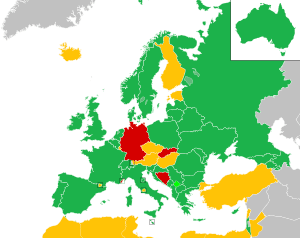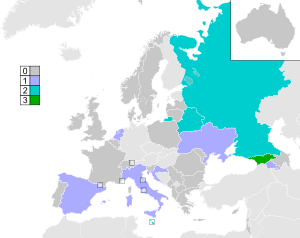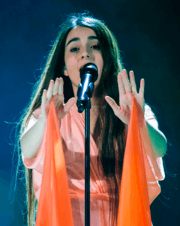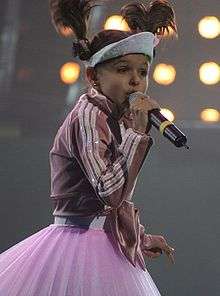List of countries in the Junior Eurovision Song Contest


Thirty-seven countries have participated in the Junior Eurovision Song Contest since it started in 2003. Of these, ten have won the contest. The contest, organised by the European Broadcasting Union (EBU), is held annually between the members of the Union. Broadcasters from different countries submit songs to the event, and cast votes to determine the most popular in the competition.
Participation in the contest is primarily open to all active member broadcasters of the EBU. To be an active member, broadcasters must be a member of the European Broadcasting Union, or be in a Council of Europe member country.[1] Eligibility to participate is not determined by geographic inclusion within the continent of Europe, despite the "Euro" in "Eurovision" — nor does it have a direct connection with the European Union. Several countries geographically outside the boundaries of Europe have competed: Cyprus, Armenia and Israel, in Western Asia, since 2003, 2007 and 2012 respectively; and Australia making a debut in the 2015 contest. In addition, several transcontinental countries with only part of their territory in Europe have competed: Russia, since 2005; Georgia, since 2007; Azerbaijan, since 2012; and Kazakhstan, which will make its first appearance in the 2018 edition. Australia, where the contest has been broadcast since 2003, debuted as a participant in the 2015 edition, with entries also in 2016 and 2017.
Both Belarus and the Netherlands entered the contest each year, whereas France and Switzerland have only entered on one occasion, both in 2004. Four countries, Germany, Slovakia, Monaco and Bosnia and Herzegovina, have attempted to enter the contest but withdrew before making a debut.
Participants

_cropped.png)

The following table lists the countries that have participated in the contest at least once. Shading indicates countries that have withdrawn from the contest.
France and Switzerland participated in the contest once, in 2004.[2][3] France will return to the contest in 2018.[4] Denmark, the host country of the first contest in 2003, has not been at the contest since 2005,[5] along with Norway and the United Kingdom, who also participated in 2003.[6][7] Poland withdrew after the 2004 contest, due to placing last in both 2003 and 2004, but returned in 2016.[8] Croatia, the first winner of the contest, returned to the contest in 2014 after nine years out of the contest.[9] However, the country placed last and withdrew again.[10]
Serbia and Montenegro performed once in 2005,[11] but dissolved in 2006,[12] causing Serbia and Montenegro to compete separately from the 2006 contest onwards.[13] Montenegro would make their debut as an independent nation in 2014.[14]
The original Scandinavian broadcasters left the contest in 2006 because they found the treatment of the contestants unethical,[15] and revived the MGP Nordic competition, which had not been produced since the Junior Eurovision Song Contest began.[16] Sweden, however, returned to the contest the following year with a new broadcaster, TV4.[17] TV4 did not participate in 2008,[18] but returned in 2009.[19] SVT returned to the contest in 2010,[20] after TV4 withdrew earlier that year. Sweden's most recent participation was in 2014.[21]
- Table key
- Withdrawn – Countries who have participated in the past but have withdrawn.
- Former – Former countries that have been dissolved.
Participating countries in the decades
The tables list the participating countries in each decade since the first Junior Eurovision Song Contest was held in 2003.
Sixteen countries participated in the first contest. Since then, the number of entries has fluctuated, peaking at eighteen in 2004 and dropping to twelve in 2012 and 2013.
Table key
- Winner – The country won that year.
- Second place – The country was ended second that year.
- Third place – The country ended third that year.
- Remaining places – The country ended from fourth to second last that year.
- Last – The country ended last that year.
- Debutant – The country made its debut during the decade.
- Undecided – The country has confirmed participation for the next JESC, however, the competition has not yet taken place.
- Disqualified or withdrawn – The country was going to participate in the JESC that year, but was disqualified or withdrew that year.
- A cross (X) means that the country participated in the contest that year.
2000s
| 2003–2009 | ||||||||
|---|---|---|---|---|---|---|---|---|
| Country | 2003 | 2004 | 2005 | 2006 | 2007 | 2008 | 2009 | |
| Х | Х | Х | ||||||
| Х | Х | Х | Х | Х | Х | Х | ||
| Х | Х | Х | Х | Х | Х | Х | ||
| Х | Х | |||||||
| Х | Х | Х | Х | |||||
| Х | Х | Х | Х | Х | Х | Х | ||
| Х | Х | Х | ||||||
| Х | ||||||||
| Х | Х | Х | ||||||
| Х | Х | Х | Х | Х | Х | |||
| Х | Х | Х | ||||||
| Х | Х | |||||||
| Х | Х | Х | Х | Х | Х | Х | ||
| Х | Х | Х | Х | Х | Х | Х | ||
| Х | Х | Х | Х | Х | Х | Х | ||
| Х | Х | Х | ||||||
| Х | Х | |||||||
| Х | Х | |||||||
| Х | Х | Х | Х | Х | Х | Х | ||
| Х | Х | Х | Х | Х | ||||
| Х | Х | Х | Х | |||||
| Х | ||||||||
| Х | Х | Х | Х | Х | ||||
| Х | Х | Х | Х | Х | Х | |||
| Х | ||||||||
| Х | Х | Х | Х | |||||
| Х | Х | Х | ||||||
2010s
| 2010–2018 | ||||||||||
|---|---|---|---|---|---|---|---|---|---|---|
| Country | 2010 | 2011 | 2012 | 2013 | 2014 | 2015 | 2016 | 2017 | 2018 | |
| Х | Х | Х | Х | X | ||||||
| Х | Х | Х | Х | Х | Х | Х | Х | X | ||
| Х | Х | Х | X | |||||||
| Х | Х | X | ||||||||
| Х | Х | Х | Х | Х | Х | Х | Х | X | ||
| Х | Х | Х | ||||||||
| Х | Х | Х | Х | |||||||
| Х | ||||||||||
| Х | Х | Х | ||||||||
| X | ||||||||||
| Х | Х | Х | Х | Х | Х | Х | Х | X | ||
| Х | Х | Х | X | |||||||
| Х | Х | X | ||||||||
| Х | Х | Х | Х | X | ||||||
| X | ||||||||||
| Х | Х | |||||||||
| Х | Х | |||||||||
| Х | Х | Х | Х | Х | Х | X | ||||
| Х | Х | Х | Х | Х | Х | X | ||||
| Х | Х | Х | Х | |||||||
| Х | Х | |||||||||
| Х | Х | Х | Х | Х | Х | Х | Х | X | ||
| Х | Х | X | ||||||||
| Х | X | |||||||||
| Х | Х | Х | Х | Х | Х | Х | Х | X | ||
| Х | Х | Х | Х | |||||||
| Х | Х | Х | Х | Х | X | |||||
| Х | Х | |||||||||
| Х | Х | Х | Х | Х | ||||||
| Х | Х | Х | Х | Х | Х | Х | Х | X | ||
| X | ||||||||||
Unsuccessful attempts to participate
There have been a few unsuccessful attempts to participate in the Junior Eurovision Song Contest. For broadcasters to participate, they must be a member of the EBU and register their intention to compete before the deadline specified in the rules of that year's event. Each participating broadcaster pays a fee towards the organisation of the contest. Should a country withdraw from the contest after the deadline, they will still need to pay these fees, and may also incur a fine or temporary ban.[24]
Bosnia and Herzegovina
| Bosnia and Herzegovina | |
|---|---|
 | |
| Member station | Radio and Television of Bosnia and Herzegovina |
| Participation summary | |
| Appearances | 0 |
| External links | |
|
www | |
Bosnia and Herzegovina was one of the nineteen countries which applied to enter the Junior Eurovision Song Contest 2007.[25] As there is a maximum number of eighteen countries permitted to perform, Georgia, the nineteenth country to apply, was unable to participate. However, on 21 June 2007, it was announced that Bosnia and Herzegovina had withdrawn from the contest, enabling Georgia to enter the contest.[26] Once again in 2008, Bosnia and Herzegovina applied to make its debut at the contest along with Azerbaijan and Israel, but all three countries withdrew before the contest took place.[27]
Prior to 2007, Bosnia and Herzegovina had broadcast the Junior Eurovision Song Contest once in 2006.[28] The contest was also broadcast live in Bosnia and Herzegovina in 2008 and 2009.[29][30] In 2011, BHRT organised a delayed broadcast of the contest.[31]
Germany
| Germany | |
|---|---|
 | |
| Member station | Norddeutscher Rundfunk |
| Participation summary | |
| Appearances | 0 |
| External links | |
|
www | |
On 21 November 2002, Germany was drawn as one of the countries to participate in the Junior Eurovision Song Contest 2003, to be represented by Norddeutscher Rundfunk (NDR), member of the ARD consortium.[32] However, Germany later withdrew from the contest. Germany was also announced as debuting in the Junior Eurovision Song Contest 2004, in Lillehammer, Norway, but on 8 June 2004, NDR announced that they would not be participating after all.[33] Prior to the 2015 contest, Frank-Dieter Freiling, chairman of the Eurovision Song Contest reference group, stated that despite support for the German children's television channel KiKa to organize Germany's participation, factors including age restrictions and broadcasting times made this unsuitable.[34] Since Italy's debut in 2014, it is the only member of the Eurovision Song Contest's Big Five that has not participated in the Junior Eurovision Song Contest.
Despite never having participated in the Junior Eurovision Song Contest, children's television channel KI.KA, subsidiary of ARD, broadcast the contest in 2003.[35] In 2013, a delegation was sent by NDR to Kiev, Ukraine to observe the contest. The following year, another German broadcaster, ZDF, sent a delegation to Malta to observe the 2014 contest.[36] The NDR Eurovision website eurovision.de provided a livestream of the 2015 and 2016 contests. Thomas Mohr commentated on both of these livestreams.[37][38]
Slovakia
| Slovakia | |
|---|---|
 | |
| Member station | Slovenská televízia |
| Participation summary | |
| Appearances | 0 |
On 21 November 2002, Slovakia was drawn as one of the countries to participate in the Junior Eurovision Song Contest 2003, to be represented by Slovenská televízia (STV).[32] However, Slovakia later announced that they would withdraw from the contest.[33]
Other EBU members who never entered the Junior Eurovision Song Contest
Other countries who have broadcast the Junior Eurovision Song Contest
| Country | Broadcaster(s) | Year(s) |
|---|---|---|
| Ràdio i Televisió d'Andorra (RTVA) | 2006[39] | |
| Radio WU | 2014[40] | |
| Eesti Televisioon (ETV) | 2003[35] | |
| Finnish Broadcasting Company (Yle) | 2003[41] | |
| Radio Television of Kosovo (RTK) | 2003,[35] 2013[42] | |
| World FM | 2014–2016[43][44][45] | |
| Music Radio | 2014–2016[43][44][45] | |
| KCGW-LP | 2014, 2016[43][45] | |
| KLZY | 2016[45] | |
| KMJY | 2016[45] | |
| WCGD | 2016[45] | |
| WUSB | 2015[44] | |
| WXDR-LP | 2014[43] | |
See also
- List of countries in the ABU Radio Song Festivals
- List of countries in the ABU TV Song Festivals
- List of countries in the Eurovision Song Contest
- List of countries in the Eurovision Asia Song Contest
- List of countries in the Eurovision Choir of the Year
- List of countries in the Turkvision Song Contest
Notes
- ^ VRT and RTBF alternated responsibilities for the contest between 2003 and 2006. From 2006 until their withdrawal VRT was Belgium's sole representative.
- ^ SVT was responsible for the representation of Sweden from 2003 to 2005. TV4 took over upon SVT's withdrawal in 2006, and competed until 2009. SVT returned to the contest in 2010.
- ^ Kosovo has never participated in the contest. However, at the time of the Junior Eurovision Song Contest 2005, Kosovo was a province of Serbia, which itself was a constituent republic of participating country Serbia and Montenegro.
References
- ↑ "Admission". EBU. European Broadcasting Union. Retrieved 12 April 2017.
- ↑ Granger, Anthony (18 July 2016). "France: Return To Junior Eurovision?". eurovoix.com. Retrieved 21 July 2017.
- ↑ Granger, Anthony (22 May 2017). "Switzerland: RSI Rules Out Return To Junior Eurovision in 2017". eurovoix.com. Retrieved 21 July 2017.
- ↑ Granger, Anthony (12 May 2018). "France: Returns to the Junior Eurovision Song Contest". eurovoix.com. Eurovoix. Retrieved 12 May 2018.
- ↑ Granger, Anthony (26 May 2017). "Denmark: Will Not Return To Junior Eurovision This Year". eurovoix.com. Retrieved 21 July 2017.
- ↑ "Norway - Junior Eurovision Song Contest". junioreurovision.tv. European Broadcasting Union. Retrieved 28 November 2017.
- ↑ "United Kingdom - Junior Eurovision Song Contest". junioreurovision.tv. European Broadcasting Union. Retrieved 28 November 2017.
- ↑ Granger, Anthony (13 July 2016). "Poland: Returns To The Junior Eurovision Song Contest". eurovoix.com. Retrieved 28 November 2017.
- ↑ Granger, Anthony (26 September 2014). "Croatia: Returns To JESC But Not ESC". eurovoix.com. Retrieved 28 November 2017.
- ↑ Granger, Anthony (23 June 2015). "Croatia: Withdraws From Junior Eurovision". eurovoix.com. Retrieved 28 November 2017.
- ↑ Philips, Roel (2 August 2005). "Serbia & Montenegro, Lithuania and Ukraine join in Hasselt". esctoday.com. Retrieved 28 November 2017.
- ↑ Bakker, Sietse (23 May 2006). "Serbia & Montenegro to split up". esctoday.com. Retrieved 28 November 2017.
- ↑ Keecha, Alex (1 October 2006). "Serbia debut for Junior contest". esctoday.com. Retrieved 28 November 2017.
- ↑ Granger, Anthony (18 July 2014). "Montenegro: Debut At JESC 2014". eurovoix.com. Retrieved 28 November 2017.
- ↑ West-Soley, Richard (18 April 2006). "Scandinavian JESC pull-out". esctoday.com. Retrieved 28 November 2017.
- ↑ Mattson, Matthias (26 November 2006). "Denmark Wins Nordic Melodi Grand Prix 2006". esctoday.com. Retrieved 28 November 2017.
- ↑ Bakker, Sietse (21 April 2006). "Junior: TV4 takes over from SVT". esctoday.com. Retrieved 28 November 2017.
- ↑ Floras, Stella (2008-04-18). "TV4 pulls out of Junior Eurovision". ESCToday. Retrieved 2009-06-12.
- ↑ Bakkar, Sietse (2009-06-08). "Exclusive: 13 countries to be represented at Junior 2009!". EBU. Retrieved 2009-06-08.
- ↑ Bakker, Sietse (2010-07-28). "Talents from 14 nations to gather at Junior Eurovision 2010". European Broadcasting Union. Retrieved 28 July 2010.
- ↑ Herbert, Emily (24 May 2017). "Sweden will not return to Junior Eurovision in 2017". eurovoix.com. Eurovoix. Retrieved 24 May 2017.
- ↑ "List of EBU Active Members". ebu.ch. European Broadcasting Union. 6 June 2014. Retrieved 27 October 2014.
- ↑ Junioreurovision.tv. History by country. Retrieved on 20 August 2014.
- ↑ "RULES OF THE 14TH JUNIOR EUROVISION SONG CONTEST" (PDF). www.iba.org.il. European Broadcasting Union. 14 April 2016. Retrieved 9 May 2017.
- ↑ "Junior 2007: 18 countries to take part". 21 May 2007. Archived from the original on 21 August 2007. Retrieved 9 May 2017.
- ↑ Floras, Stella (21 June 2007). "Bosnia & Herzegovina withdraw from JESC". Retrieved 9 May 2017.
- ↑ "Ukraine to host Junior Eurovision in 2009!". eurovision.tv. European Broadcasting Union. 7 June 2008. Retrieved 26 June 2017.
- ↑ Escudero, Victor M. (22 November 2012). "Remember the 2006 Junior Eurovision Song Contest?". www.junioreurovision.tv. European Broadcasting Union. Retrieved 26 June 2017.
- ↑ "Tonight: Junior 2008 live from Cyprus!". eurovision.tv. European Broadcasting Union. 22 November 2008. Retrieved 26 June 2017.
- ↑ Slim, Jarmo (21 November 2009). "TONIGHT: THE BIG SHOW!!". www.junioreurovision.tv. European Broadcasting Union. Retrieved 26 June 2017.
- ↑ Granger, Anthony (3 December 2011). "Where can I watch JESC 2011?". eurovoix.com. Retrieved 27 June 2017.
- 1 2 "EBU news - 2002_11_22-1". 22 November 2002. Archived from the original on 14 September 2012. Retrieved 9 May 2017.
- 1 2 Bakker, Sietse (12 May 2003). "Second Junior Eurovision to take place in London". Retrieved 9 May 2017.
- ↑ Granger, Anthony (18 November 2015). "Germany: Discusses Obstacles Of Future Participation". eurovoix.com. Retrieved 27 June 2017.
- 1 2 3 "The new Junior Eurovision Song Contest in high definition". European Broadcasting Union. Archived from the original on 28 September 2012. Retrieved 14 May 2017.
- ↑ Granger, Anthony (17 November 2014). "Germany: ZDF Observed JESC 2014". eurovoix.com. Retrieved 27 June 2017.
- ↑ Hendrickx, Jonathan (16 November 2015). "German interest in Junior Eurovision Song Contest". songfestival.be. Retrieved 14 May 2017.
- ↑ Granger, Anthony (3 November 2016). "Germany: Junior Eurovision Online Broadcast Confirmed". eurovoix.com. Retrieved 14 May 2017.
- ↑ "Andorra: No Participation in Eurovision Events for the Foreseeable Future". Eurovoix. 19 May 2018. Retrieved 27 July 2018.
- ↑ Granger, Anthony (24 October 2014). "Argentina: Radio WU To Broadcast JESC 2014". eurovoix.com. Retrieved 28 June 2017.
- ↑ "YLE2: 21.15 Junior Euroviisut 2003 lisätiedot 15.11.2003 televisiossa 467334". netello.fi. 15 November 2003. Archived from the original on 27 February 2014. Retrieved 28 June 2017.
- ↑ Granger, Anthony (30 November 2013). "Kiev'13: How To Watch Tonight's Show". eurovoix.com. Retrieved 28 June 2017.
- 1 2 3 4 Lockett, Katherine (13 November 2014). "It's a 'TEN' for Radio!". www.junioreurovision.tv. European Broadcasting Union. Retrieved 28 June 2017.
- 1 2 3 Spence, Ewan (13 November 2015). "Listen To Junior Eurovision On Your Radio". escinsight.com. Retrieved 28 June 2017.
- 1 2 3 4 5 6 Wright, Sharleen (18 November 2016). "Junior Eurovision Live On Your Radio This Sunday". escinsight.com. Retrieved 28 June 2017.